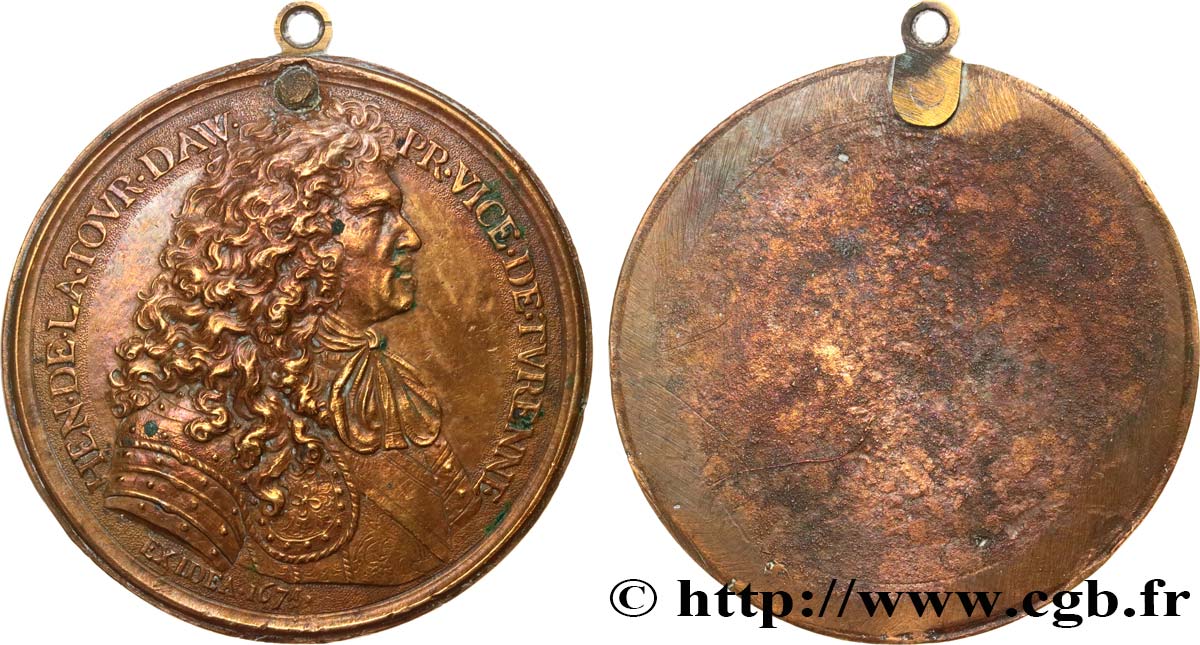Obverse
Obverse legend : HEN. DE. LA. TOVR. DAVV. PR. VICE. DE. TVRENNE..
Obverse description : Buste cuirassé avec un large jabot d’Henri de La Tour d’Auvergne à droite, signé à l’exergue : EXIDEA 1675.
Obverse translation : (Henri de la Tour d’Auvergne prince et vicomte de Turenne).
Reverse
Commentary
Historical background
ARDENNES - PRINCIPALITY OF SEDAN - HENRI DE LA TOUR D'AUVERGNE, VISCOUNT OF TURENNE
(1611-1675)
Born in 1611 in Sedan, Henri was the second son of Henri de La Tour d'Auvergne, Duke of Bouillon and Sovereign Prince of Sedan.. Grandson by his mother of Guillaume le taciturne, he was raised in Protestantism and was destined for the profession of arms, his first regiment was entrusted to him at the age of 14 in 1625. He did not really cut his teeth until four years later under the orders of his uncle the Prince of Orange, Frédéric-Henri. In the good graces of Louis XIII, Gaston d'Orléans and Richelieu, he entered the service of France in 1630 to participate in the Piedmont campaign.. Subsequently, he quickly distinguished himself, at the siege of Marsal in 1633 or by taking Turin in 1640. Of great birth, with personal qualities and in the boiling of the Thirty Years War, he quickly rose through the ranks. Close to his men in the field, courageous and lucky, a good tactician, Turenne became Marshal of France in 1643 with the support of Mazarin, he won the battle of Nördlingen with Condé.. He was then in all the campaigns between 1644 and 1648 and commanded the army of Germany. Considering himself poorly rewarded, he joined the Fronde party in 1649 then fought from 1650 for the Spaniards but was beaten at Rethel in 1650.. Reconciled with the Court after the departure of Mazarin, he defeated Condé in the Faubourg Saint-Antoine and thus delivered Paris to the king.. He was responsible from 1653 to 1658 for ending the Franco-Spanish war.. He defeated the Spaniards and Condé at Arras in 1654 and at the Dunes in 1658, which forced Philippe IV to sign the Peace of the Pyrenees. General marshal of the king's camps and armies, he educated Louis XIV and commanded during the Wars of Devolution and Holland. In 1667, he conquered Flanders in three months; in 1674, he won victories at Sinzheim then Enzheim and finally at Turckheim, in the middle of winter, which gave him Alsace. He was killed by a cannonball the following year in Sasbach against Montecuccoli. Louis XIV had him buried in Saint-Denis near the kings of France. In 1800, his remains were transported to the church of Les Invalides. He remains the greatest French general before Napoleon I, also a follower of the war of movement.








 Report a mistake
Report a mistake Print the page
Print the page Share my selection
Share my selection Ask a question
Ask a question Consign / sell
Consign / sell
 Full data
Full data